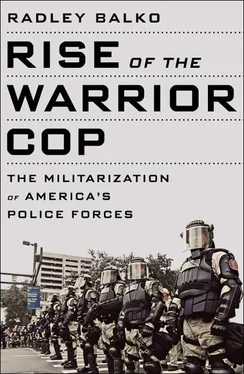No soldier shall, in time of peace be quartered in any house, without the consent of the owner, nor in time of war, but in a manner to be prescribed by law.
You might call it the runt piglet of the Bill of Rights amendments—short, overlooked, sometimes the butt of jokes. The satirical news site The Onion once mocked it with an article about a Third Amendment advocacy group and its record 191-year fight to keep the amendment intact. The group’s motto: “Keep the fat hands of soldiers out of America’s larders!”
The Supreme Court has yet to hear a case that turns on the Third Amendment, and only one such case has reached a federal appeals court. 1There have been a few periods in American history when the government probably violated the amendment, and on a large scale, but those incursions into quartering didn’t produce any significant court challenges. In the War of 1812, for example, federal troops were quartered in private homes by the thousands, and quartering was also widespread during the Civil War. On both occasions, the quartering was neither authorized nor prescribed by Congress. During World War II, US military forces stationed themselves in the homes of Aleutian Islanders in preparation for an anticipated attack by Japan. Though it is likely that the government overstepped its authority in all of these instances, they failed to produce any work for the Supreme Court to hash out the amendment’s protections and exceptions. Not surprisingly, then, Third Amendment scholarship is a thin field, comprising just a handful of law review articles, most of which either look at the amendment’s history or pontificate on its obsolescence. 2
Given the apparent irrelevance of the amendment today, we might ask why the Framers found it so important in the first place. After all, citizens were made to sacrifice for national defense in ways far more intrusive. The Constitution allows for conscription, for example, and the Continental Army openly seized property like livestock and food from colonists. 3Why, then, was quartering so despised?
One answer returns to the Castle Doctrine. If you revere the principle that a man’s home is his castle, it hardly seems just to force him to share a portion of it with soldiers—particularly when the country isn’t even at war. But the historical context behind the Third Amendment shows that the Framers were worried about something more profound than fat soldier hands stripping the country’s larders. The amendment was a placeholder for the broader aversion to an internal standing army.
At the time the Third Amendment was ratified, the images and memories of British troops in Boston and other cities were still fresh, and the clashes with colonists that drew the country into war still evoked strong emotions. What we might call the “Symbolic Third Amendment” wasn’t just a prohibition on peacetime quartering, but a more robust expression of the threat that standing armies pose to free societies. It represented a long-standing, deeply ingrained resistance to armies patrolling American streets and policing American communities.
And in that sense, the spirit of the Third Amendment is anything but anachronistic.
AS WITH THE CASTLE DOCTRINE, COLONIAL AMERICA INHERITED its aversion to quartering from England. British opposition to the practice dates back to the decade after the Norman Conquest, when King William first stationed a permanent army in England for national defense. To raise soldiers for an army, subsequent kings would often pardon killers and thieves, conscript them into military service, then billet them in towns and cities. As you might imagine, giving criminals weapons and the authority of soldiers, then billeting them among the population, brought some problems.
Opposition to quartering persisted for centuries, culminating with a ban on the practice in the English Bill of Rights signed by William and Mary in 1689.
Appreciation of the problems associated with putting soldiers among the citizenry ultimately carried over to the New World, just as the Castle Doctrine did. And as with the Castle Doctrine, England wasn’t nearly as respectful of the principle in the colonies as it was at home. The first significant escalation of the issue came in the 1750s, when the British sent over thousands of troops to fight the Seven Years’ War (known in the United States as the French and Indian War). In the face of increasing complaints from the colonies about the soldiers stationed in their towns, Parliament responded with more provocation. The Quartering Act of 1765 required the colonists to house, feed, and supply British soldiers (albeit in public facilities). Parliament also helpfully provided a funding mechanism with the hated Stamp Act. 4
Protest erupted throughout the colonies, both in the streets and in the legislatures. 5Some protests spilled over into violence, most notably the Boston Massacre in 1770. England only further angered the colonists by responding with even more restrictions on trade and imports (the laws that customs officials used general warrants to enforce). Parliament then passed a second Quartering Act, in 1774, this time specifically authorizing British generals to put soldiers in colonists’ homes. There were no wars going on at the time. The law was aimed squarely at correcting the colonies’ insubordination. England then sent troops to emphasize the point. 6
It was the deployment of British soldiers to colonial cities strictly for the purpose of enforcing the law that set long-smoldering hostilities aflame. Using general warrants, British soldiers were allowed to enter private homes, confiscate what they found, and often keep the bounty for themselves. The policy was reminiscent of today’s civil asset forfeiture laws, which allow police to seize and keep for their departments cash, cars, luxury goods, and even homes, often under only the thinnest allegation of criminality.
Quartering itself—the specific burden of giving up a bed to a soldier, feeding him, and clothing him—was not what edged cities like Boston to the brink of war. The actual quartering of British troops in the private homes of colonists was rare, at least up until the start of the American Revolution. 7It was the predictable fallout from positioning soldiers trained for warfare on city streets, among the civilian populace, and using them to enforce laws and maintain order that enraged colonists. Contemporary newspaper accounts documented frequent and increasingly bitter altercations between soldiers and citizens. 8Bostonians were British subjects, but they were being treated like enemies of the state. They began to interpret the stationing of troops in their city as an act of war.

AFTER THE AMERICAN REVOLUTION, THE LEADERS OF THE new American republic had some difficult decisions to make. They debated whether the abuses that British soldiers had visited upon colonial America were attributable to quartering alone or to the general aura of militarism that came with maintaining standing armies in peacetime—and whether restricting, prohibiting, or providing checks on either practice would prevent the abuses they feared.
Antifederalists like George Mason, Patrick Henry, Sam Adams, and Elbridge Gerry opposed any sort of national army. They believed that voluntary, civilian militias should handle issues of national security. To a degree, the federalists were sympathetic to this idea. John Adams, Thomas Jefferson, and James Madison had all written on the threat to liberty posed by a permanent army. Even Alexander Hamilton, the most federalist of the federalists, presciently warned about the temptation to sacrifice liberty at home for security from outside threats:
Читать дальше













